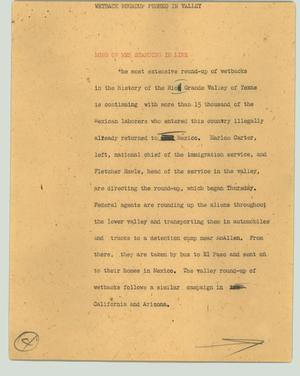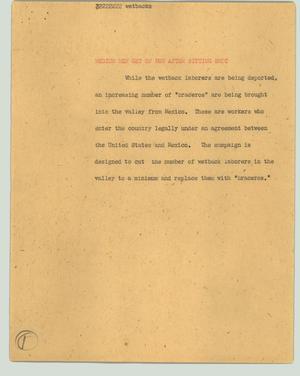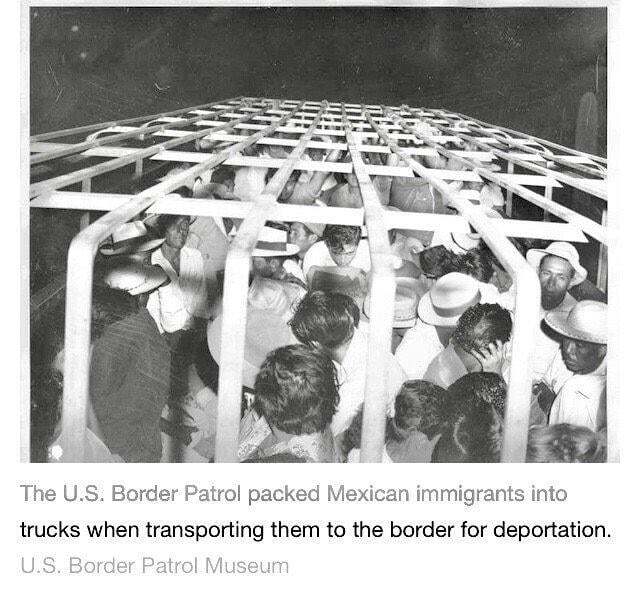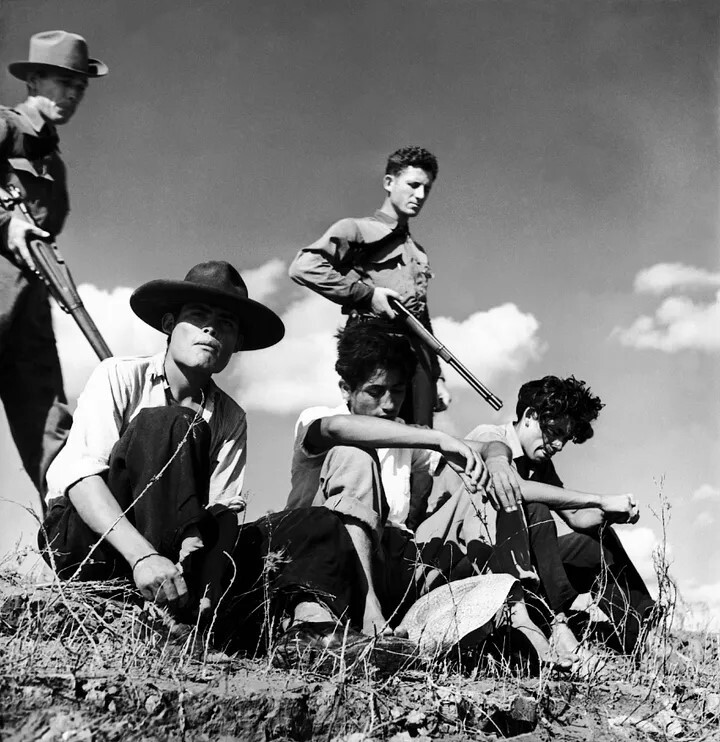Using "Wetback roundup" as an Argument for Higher Education
The term "wetback roundup" historically refers to aggressive immigration enforcement actions targeting undocumented immigrants, particularly from Latin American countries, notably Mexico. These events are often characterized by their controversial and sometimes inhumane treatment of the individuals involved.
The term "wetback" is a derogatory slur implying that Mexican migrants crossed the Rio Grande River to enter the United States. It reflects a dehumanizing perspective, suggesting that these individuals are dirty, unworthy, and unwelcome.
News Script: “Wetback roundup pushed in Valley
July 18, 1954, WBAP-TV
Television station : Fort Worth, Texas
“The most extensive round-up of wetbacks in the history of the Rio Grande Valley of Texas is continuing with more than 15 thousand of Mexican Laborers who entered this country illegally already returned to Mexico. Harlon Carter, left, national chief of the immigration service, and Fletcher Rawls, head of the service in the valley are directing the round-up which began Thursday. Federal Agents are rounding up the aliens throughout the lower valley and transporting them in automobiles and trucks to detention camp near McAllen. From there, they are taken by bus to El Paso and sent on to their homes in Mexico. The valley round-up of wetbacks follows a similar campaign in California and Arizona.”
“While the wetback laborers are being deported, an increasing number of “braceros” are being brought into the valley from Mexico.” These are workers who enter the country legally under an agreement between the United States and Mexico. The campaign is designed to out the number of wetback laborers in the valley to a minimum and replace them with “braceros.””
What the video and script don’t reveal:
- Anti-Mexican sentiment had been brewing for years (Blakemoore, 2023).
- Mexico wanted their citizens for cheap labor, as did the United States (Hernandez, 2006, Blakemoore, 2023.
- Border Patrol agents were reported to have infiltrated farms, factories, restaurants, and towns with one simple goal; round up as many Mexicans as possible; no due process acknowledged (Kata, 2023).
- Hundreds of Americans who could not produce proof of citizenship quickly were wrongly detained and deported (Hernandez, 2006).
- Farmers were reported to be upset that their cheap labor was being removed during harvest (Blakemoore, 2024).
- Public parks became detention centers (Hernandez, 2006).
- Some deportees were taken to the southern Mexico border (regardless of origin), stranded without connections, money, or food (Blakemoore, 2024).
How did we get here?
Historical Context and Economic Impact
Following the Mexican Revolution (1910–20), Mexico encountered severe economic instability, political upheaval, and social unrest. These issues drove many Mexicans to migrate to the United States in search of better opportunities. During World War I (1914–18), Mexican laborers were instrumental in filling critical labor shortages in U.S. industries, including agriculture and manufacturing (Britannica, 2024).
Great Depression and Repatriation
The Great Depression, beginning in 1929, plunged the U.S. into economic turmoil, leading to soaring unemployment and intensified resentment towards Mexican workers, who were perceived as taking jobs from American citizens. This resentment fueled repatriation campaigns and voluntary returns, resulting in the displacement of between 400,000 and 1,000,000 Mexicans and Mexican Americans during the 1930s (Britannica, 2024). These campaigns often targeted even those with legal residency, disrupting many lives.
Bracero Program
During World War II (1939–45), the U.S. faced severe labor shortages, especially in agriculture. In response, the Bracero Program was launched in 1942, permitting U.S. businesses to hire Mexican nationals for agricultural work through short-term contracts. The program was intended to benefit both the U.S. agricultural sector and Mexico by providing workers with valuable skills eventually supporting Mexico’s economy. Although the program promised fair wages, protection against discrimination, and other benefits, many braceros encountered systemic discrimination, received lower-than-promised wages, and worked under harsh conditions (Britannica, 2024).
In the summer of 1954, Operation Wetback, an immigration enforcement campaign, resulted in the mass deportation of Mexican nationals. The operation, initiated by U.S. Attorney General Herbert Brownell, Jr. and approved by President Dwight D. Eisenhower, aimed to address public frustration over undocumented workers and employer corruption. Official figures reported around 1,100,000 deportations, though estimates suggest the actual number was closer to 300,000.
Discrimination Protection
Despite agreements between the U.S. and Mexico designed to protect migrant workers, Mexican laborers frequently faced widespread discrimination and racism, particularly in farming communities. This prejudice was evident both within and outside their workplaces. Migrants suffered from harsh working conditions, including inadequate wages, exposure to toxic chemicals, and additional charges for room and board. They endured long hours under difficult conditions and were often separated from their families in Mexico. Agricultural companies continued to depend heavily on this labor force, despite the exploitation and lack of accountability (Blakemoore, 2024).
End of the Bracero Program and Operation Wetback
The Bracero Program ended in 1964 due to increasing public concern about undocumented workers and their impact on wages. However, migrant and undocumented workers continued to work in U.S. agriculture.
How can higher education help:
Understanding Human Rights and Ethics: Higher education often includes courses in ethics, human rights, and social justice. Analyzing events like the "wetback roundup" in an academic setting allows students to develop a deeper understanding of human rights abuses, ethical implications of policy decisions, and the importance of humane treatment regardless of legal status.
Policy Analysis and Reform: Higher education encourages critical thinking and policy analysis skills. Students can examine the policies and systemic issues that lead to controversial enforcement actions like the "wetback roundup." This analysis can lead to discussions about the need for comprehensive immigration reform and more humane enforcement strategies.
Advocacy and Activism: Education empowers individuals to become advocates for social change. Students who learn about such events may be inspired to participate in activism and advocacy efforts aimed at improving immigration policies and protecting human rights.
Cultural Understanding and Sensitivity: Higher education promotes cultural understanding and sensitivity. Studying events like the "wetback roundup" can foster discussions about cultural biases, stereotypes, and the impact of immigration policies on communities, encouraging empathy and awareness.
Legal and Constitutional Implications: Studying these events can also highlight legal and constitutional issues related to immigration enforcement. This includes discussions on due process, civil liberties, and the balance between national security and individual rights.
" Mexican immigrants in the U.S. being arrested in the 1950s." (Keystone-France/Gamma-Keystone via Getty Images)
In summary,
The "wetback roundup" was ethically and morally tragic due to its dehumanizing treatment of undocumented immigrants, discriminatory practices, and violations of human rights. These actions not only caused harm and fear within immigrant communities but also reinforced negative stereotypes. To prevent such injustices and promote a more equitable society, higher education plays a vital role by offering courses in human rights, ethics, and social justice, which foster critical understanding and advocacy.
Integrating rigorous policy analysis and reform can address past mistakes and ensure humane practices. Additionally, activism and advocacy drive necessary changes, while cultural understanding and sensitivity promote respect and inclusion. Together, these efforts are crucial for upholding dignity and fairness in immigration policies and practices.
While the "wetback roundup" itself is not a positive event, studying it within the context of higher education can provide valuable insights into human rights, policy reform, advocacy, cultural sensitivity, and legal principles. It underscores the importance of education in fostering informed, empathetic, and proactive citizens capable of addressing complex social issues.
Resources:
Kratz, J. (2023, September 27). The Bracero Program: Prelude to Cesar Chavez and the Farm Worker Movement. National Archives and Records Administration. https://prologue.blogs.archives.gov/2023/09/27/the-bracero-program-prelude-to-cesar-chavez-and-the-farm-worker-movement/
Blakemore, E. (2023, August 20). The long history of Anti-Latino Discrimination in America. History.com. https://www.history.com/news/the-brutal-history-of-anti-latino-discrimination-in-america
Blakemore, E. (2024, July 16). The Largest Mass Deportation in American History. History.com. https://www.history.com/news/operation-wetback-eisenhower-1954-deportation
Executive Order 8802 dated June 25, 1941, in which President Franklin D. Roosevelt prohibits discrimination in the defense program; 6/25/1941; Executive Orders, 1862 - 2011; General Records of the United States Government, Record Group 11; National Archives Building, Washington, DC.
Encyclopædia Britannica, inc. (n.d.). Bracero Program. Encyclopædia Britannica. https://www.britannica.com/topic/Operation-Wetback
Hernandez, Kelly L.(2017, March 23 Operation Wetback actually eased immigration law enforcement in the U.S.-Mexico border region. UCLA Newsroom. https://newsroom.ucla.edu/stories/ucla-faculty-voice-largest-deportation-campaign-in-u-s-history-is-no-match-for-trumps-pla




